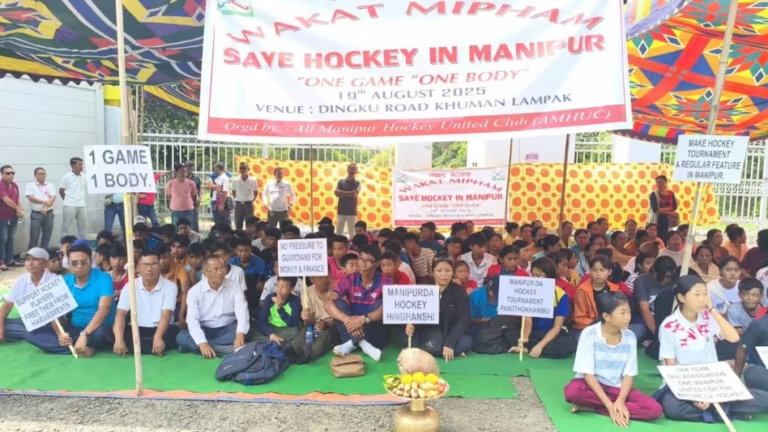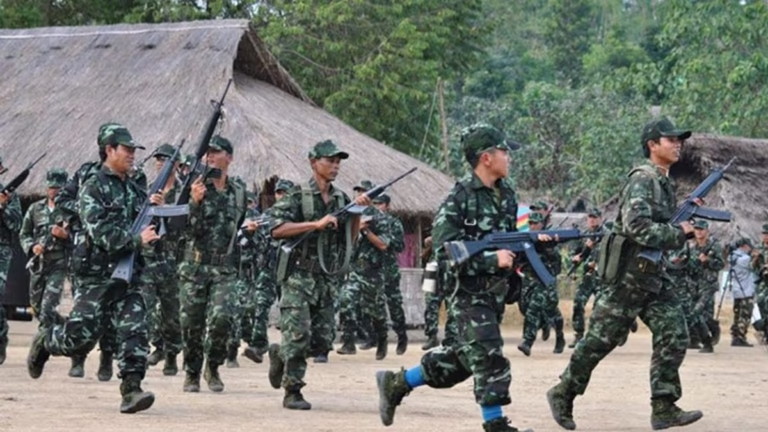Manipur Security Forces Recover Weapons & Explosives in Joint Operation at Kakching District
Summary of the News Article
In a decisive move to bolster regional security, Manipur security forces conducted a joint operation in Kakching District, resulting in the recovery of a significant cache of weapons and explosives. This well-coordinated effort by various agencies highlights the ongoing commitment to maintaining law and order in the region. The operation not only disrupts potential criminal activities but also serves as a strong message against illicit arms trafficking, ensuring a safer environment for the local community.
In-Depth Article
Introduction: A Landmark Operation for Manipur’s Security
Hey there, dear reader! Today, we’re diving deep into an operation that underscores the relentless commitment of Manipur’s security forces to uphold peace and stability in the region. Imagine a high-stakes chess match, where every move counts, and the opponents are those who seek to destabilize our communities through illicit weapons and explosives. In a joint operation at Kakching District, Manipur security forces have struck a major blow to criminal elements by recovering a trove of dangerous arms and explosives. This operation is not just a routine security measure—it’s a powerful statement that safety and order will always triumph over chaos and lawlessness.
Let’s break down the details of this operation, understand the significance behind every recovered item, and explore how such initiatives shape the future of security in Manipur.
Setting the Stage: The Security Landscape in Manipur
Manipur, a state known for its cultural vibrancy and rich history, faces unique security challenges. Over the years, the region has witnessed various incidents related to arms trafficking and illicit explosives, which can jeopardize community safety and spark unrest. Think of it like a fortress under constant threat from inside and outside forces; every recovered weapon is like reinforcing the walls of that fortress.
In such an environment, every operation by security forces becomes crucial. The Kakching District operation is a prime example of proactive measures taken to keep potential threats at bay. The joint effort by various agencies—from local police units to specialized counter-terrorism squads—illustrates a well-oiled mechanism designed to protect the public and ensure that criminals have no safe haven.
The Operation: A Collaborative Effort
Let’s walk through what happened. In a meticulously planned and executed joint operation, security forces converged on a suspected hideout in Kakching District. With intelligence reports hinting at illegal arms activity, the operation was launched with one clear objective: to recover any dangerous materials that could be used to harm innocent civilians.
Imagine a team of experts working together like a finely tuned orchestra, where every instrument plays its part to perfection. In this operation, coordination was key. Officers from various units brought their unique skills to the table, ensuring that every step—from the initial raid to the careful collection of evidence—was executed with precision. The recovered cache included not just standard firearms but also a variety of explosives that could have been used in acts of terror or organized crime.
This collaborative effort is a testament to the strength and resilience of Manipur’s security apparatus. It shows that when different agencies unite with a common purpose, they create an impenetrable shield against those who aim to destabilize the region.
Understanding the Recovered Arsenal: What Was Found?
Now, let’s delve into what makes this operation so significant by looking at the types of weapons and explosives recovered. The cache included a range of items, each posing a distinct threat if left in the wrong hands:
- Firearms and Ammunition: These are the bread and butter of illicit arms trafficking. Firearms, whether handguns or rifles, can quickly escalate violence during criminal activities. Recovering them means fewer chances for criminals to perpetrate violent crimes.
- Explosives: This category includes various types of explosive materials that, if combined or modified, could cause large-scale damage. Think of it as defusing a time bomb before it has a chance to go off. Explosives recovered in such operations are particularly dangerous because of their potential for mass harm.
- Smuggling Tools: Along with the main arsenal, authorities often recover accessories used to conceal or transport these dangerous materials. These might include specialized containers, communication devices, or even forged documents meant to aid in smuggling operations.
Each recovered item represents a victory against the threat of violence and terror. By removing these weapons from circulation, the security forces have not only prevented potential crimes but also disrupted the supply chain that fuels criminal networks.
The Impact on Local Communities: Restoring Peace and Trust
When security forces carry out such operations, the benefits extend far beyond the immediate recovery of weapons. The local community in Kakching—and indeed throughout Manipur—experiences a renewed sense of safety and trust. Imagine living in a neighborhood where you constantly worry about random acts of violence; an operation like this can dramatically shift that narrative.
Residents, business owners, and community leaders feel reassured knowing that their safety is a top priority. The recovery of weapons and explosives sends a strong message: law enforcement is vigilant, proactive, and ready to act against any threat. This boost in public confidence can lead to more community cooperation, as residents are more likely to share information and support future security initiatives.
The Strategic Importance: Beyond Immediate Security
While the operation’s immediate success is evident, its strategic implications are even more far-reaching. Every action taken by security forces contributes to a larger strategy aimed at curbing the overall influence of criminal networks in the region. Let’s break down the broader benefits:
- Disruption of Criminal Networks: Illicit arms trafficking is often the backbone of organized crime and terrorism. By intercepting weapons and explosives, the security forces not only prevent individual crimes but also weaken the broader criminal ecosystem.
- Deterrence: When potential offenders see that the authorities are actively and effectively dismantling arms caches, they are less likely to engage in criminal activities. It’s a classic case of deterrence—if you know the risks are high, you’re less likely to take them.
- Intelligence Gathering: Operations like this provide valuable intelligence that can help predict and prevent future threats. Every piece of evidence recovered, every document or device found, adds to a database that can be used to track criminal patterns and plan further interventions.
- Strengthening Inter-Agency Collaboration: The success of the Kakching operation reinforces the importance of collaborative efforts between various security agencies. This sets a benchmark for future operations and enhances the overall security architecture of the region.
Challenges and Hurdles: The Road to Secure Manipur
Of course, no operation is without its challenges. The recovery of weapons and explosives in a complex landscape like Manipur’s comes with several hurdles:
- Intelligence Gathering: Accurate intelligence is the cornerstone of any successful operation. In areas with vast, rugged terrains and intricate local dynamics, gathering reliable information is a formidable task.
- Resource Allocation: Ensuring that all agencies have the necessary resources—be it manpower, technology, or logistics—is critical. Joint operations require seamless coordination and sufficient backing from higher authorities.
- Legal and Judicial Processes: Once the items are recovered, the challenge shifts to ensuring that legal processes follow swiftly and justly. Convicting those responsible requires a robust judicial system that can keep pace with the complexities of criminal investigations.
- Community Cooperation: Sometimes, criminal networks thrive in secrecy and fear. Encouraging community members to come forward with information can be difficult, but it is essential for the sustained success of security measures.
Despite these challenges, the operation at Kakching stands as a beacon of success, showcasing how perseverance and collaborative spirit can overcome formidable obstacles.
Innovative Tactics: How Technology Enhances Security Operations
One of the keys to the success of modern security operations lies in the innovative use of technology. In Kakching, several cutting-edge tools played a vital role:
- Surveillance Systems: High-definition cameras, drones, and satellite imagery have become indispensable. These systems provide real-time information, allowing security forces to monitor suspicious activities and plan their interventions with precision.
- Data Analytics: Advanced data analytics help in predicting potential hotspots and identifying trends in criminal activities. By analyzing past incidents, authorities can anticipate where the next threat might emerge.
- Communication Tools: Secure and rapid communication channels ensure that all agencies involved in the operation are in sync. This minimizes delays and enhances coordination, making operations smoother and more effective.
- Forensic Technologies: Once items are recovered, forensic analysis plays a crucial role in linking them to broader criminal networks. Technologies like ballistic analysis and explosive residue testing help build strong cases against perpetrators.
These technological advancements not only increase the effectiveness of security operations but also instill a sense of confidence among the public that modern tools are being used to protect their safety.
Comparative Insights: Lessons from Other Regions
It’s always useful to look at similar operations in other parts of the world. Cities and regions facing similar challenges have adopted multi-agency strategies to great success. For instance, coordinated operations in regions of Southeast Asia have demonstrated that robust inter-agency collaboration, backed by advanced surveillance and analytics, can drastically reduce the circulation of illegal arms.
By learning from these examples, Manipur’s security apparatus is not only adapting best practices but also contributing to a broader narrative of regional stability. The success of the Kakching operation may well serve as a model for other regions grappling with similar security challenges.
Policy Implications: Building a Resilient Security Framework
The implications of this operation stretch into the realm of policy-making. Here are some strategic areas that can benefit from the insights gained through the Kakching operation:
- Revised Security Protocols: Regular reviews and updates of security protocols ensure that operations remain agile and responsive to emerging threats.
- Enhanced Training Programs: Investing in continuous training for security personnel is crucial. Training programs that incorporate both traditional methods and modern technology can better prepare forces for future challenges.
- Community Engagement Initiatives: Policies aimed at building trust between law enforcement and local communities are vital. Encouraging citizen participation through awareness programs can lead to more effective intelligence gathering and a safer environment.
- Inter-Agency Coordination Mechanisms: Formalizing protocols for inter-agency cooperation ensures that future operations benefit from streamlined communication and resource sharing.
- Judicial Support and Transparency: Strengthening the judicial processes related to arms trafficking cases ensures that perpetrators are held accountable swiftly, deterring future crimes.
Such policy measures, when implemented effectively, can create a resilient security framework that is capable of adapting to both current and future challenges.
The Human Element: Recognizing the Bravery of Our Security Forces
Let’s take a moment to appreciate the human side of this story. Behind every successful operation are brave men and women who put their lives on the line to protect others. The officers involved in the Kakching operation exemplify courage, dedication, and professionalism. They navigate dangerous terrains, rely on precise intelligence, and work in coordination under high pressure—all for the sake of public safety.
Their efforts remind us that effective security is not just about technology or tactics; it’s about the commitment of individuals who believe in a safer, more secure community. Their bravery not only disrupts criminal networks but also inspires confidence and hope in the hearts of citizens.
Community Reactions: Restoring Trust Through Action
The local communities in Kakching and throughout Manipur have reacted positively to this significant operation. Residents express relief and gratitude, knowing that proactive steps are being taken to counter criminal activities. Community leaders have emphasized the importance of such actions in restoring trust between the public and law enforcement.
Public sentiment has been bolstered by regular updates from authorities, ensuring that the community remains informed and involved. This transparency fosters an environment where citizens feel empowered to contribute to the collective effort of maintaining peace and security.
Looking Ahead: The Future of Security in Manipur
What does the future hold following this operation? While the recovery of weapons and explosives is a notable victory, the work is far from over. The operation at Kakching is a stepping stone towards building an even more secure Manipur. It sets a precedent for future actions and encourages continuous improvement in security protocols and inter-agency coordination.
The journey ahead involves not only thwarting immediate threats but also addressing the systemic issues that allow illicit arms to circulate. With sustained efforts, technological integration, and community collaboration, the vision of a secure, peaceful Manipur is within reach.
Conclusion: Strengthening the Pillars of Peace and Security
In conclusion, the joint operation in Kakching District represents a pivotal moment in the fight against arms trafficking and explosive-related threats in Manipur. It is a story of vigilance, collaboration, and unwavering commitment to the safety of every citizen. By recovering dangerous weapons and explosives, the security forces have not only disrupted potential criminal activities but have also reinforced the community’s trust in their ability to protect and serve.
This operation is a reminder that every step taken towards strengthening security infrastructure and inter-agency collaboration builds a safer future. Let us all stand together in support of these brave efforts and contribute in our own ways to foster a peaceful, secure environment for generations to come.
FAQs
- What prompted the joint operation in Kakching District?
Intelligence reports indicated the presence of illicit arms and explosives, prompting security forces from various agencies to launch a coordinated operation aimed at preventing potential criminal activities. - What types of weapons and explosives were recovered?
The operation yielded a range of items, including firearms, ammunition, various types of explosives, and smuggling tools used to transport and conceal these dangerous materials. - How do these operations enhance community safety?
By removing dangerous weapons from circulation and disrupting criminal networks, such operations prevent potential acts of violence, boost public confidence, and reinforce the message that law enforcement is committed to maintaining order. - What challenges do security forces face during such operations?
Challenges include gathering accurate intelligence, coordinating among multiple agencies, ensuring proper resource allocation, and overcoming logistical hurdles in complex terrains, all while ensuring legal processes are followed. - What policy measures could further strengthen security in Manipur?
Enhanced training programs, improved surveillance and communication technologies, community engagement initiatives, inter-agency coordination protocols, and robust judicial support are key measures to create a resilient security framework.




